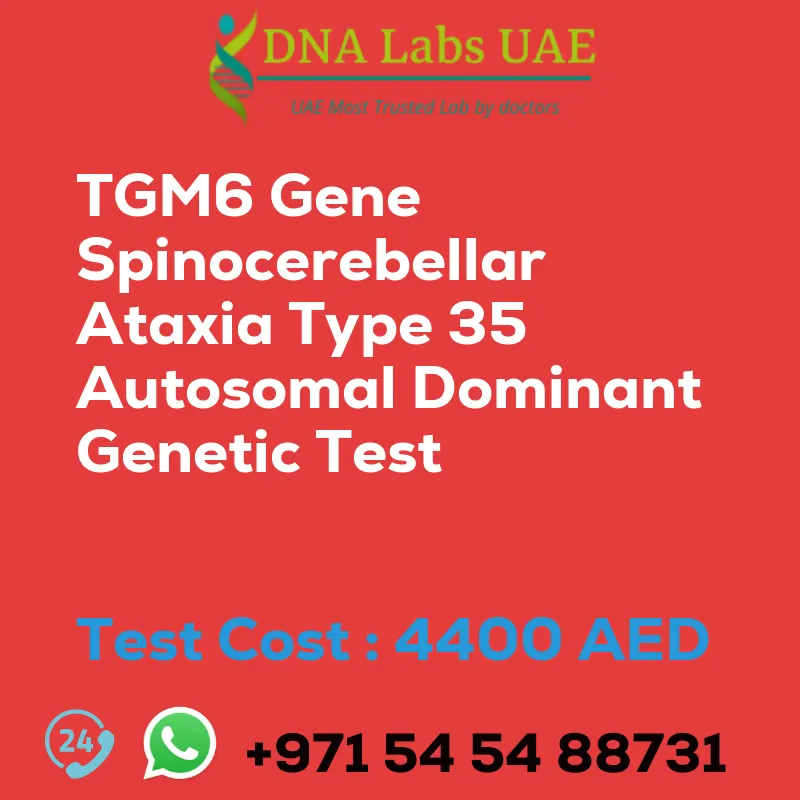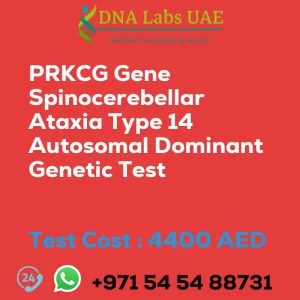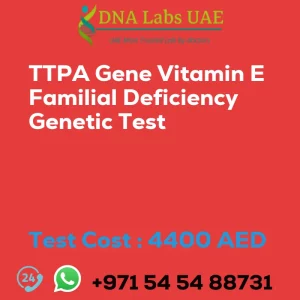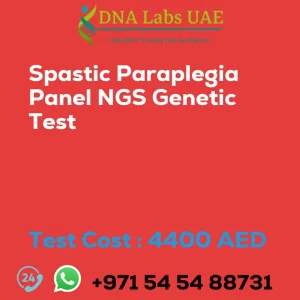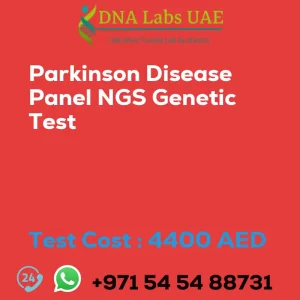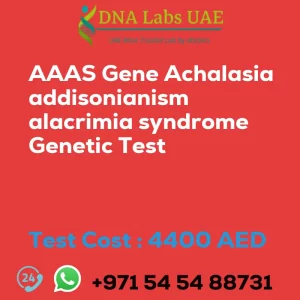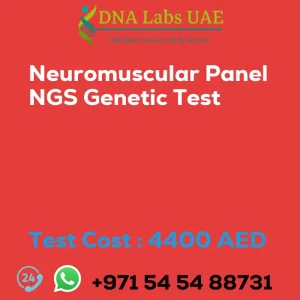TGM6 Gene Spinocerebellar ataxia type 35 autosomal dominant Genetic Test
Components: TGM6 Gene Spinocerebellar ataxia type 35 autosomal dominant Genetic Test
Price: 4400.0 AED
Sample Condition: Blood or Extracted DNA or One drop Blood on FTA Card
Report Delivery: 3 to 4 Weeks
Method: NGS Technology
Test Type: Neurological Disorders
Doctor: Neurologist
Test Department: Genetics
Pre Test Information: Clinical History of Patient who is going for TGM6 Gene Spinocerebellar ataxia type 35, autosomal dominant NGS Genetic DNA Test. A Genetic Counselling session to draw a pedigree chart of family members affected with TGM6 Gene Spinocerebellar ataxia type 35, autosomal dominant.
Test Details: Spinocerebellar ataxia type 35 (SCA35) is a rare genetic disorder characterized by progressive ataxia, which affects coordination and balance. It is an autosomal dominant disorder, meaning that an affected individual has a 50% chance of passing on the condition to each of their children. The TGM6 gene is associated with SCA35. Mutations in this gene can lead to the development of the disorder. The TGM6 gene provides instructions for making an enzyme called transglutaminase 6, which is involved in the development and maintenance of neurons in the cerebellum. To diagnose SCA35, a Next-Generation Sequencing (NGS) genetic test can be performed. This test analyzes the individual’s DNA to identify any mutations or variations in the TGM6 gene. NGS technology allows for the simultaneous analysis of multiple genes, providing a comprehensive assessment of genetic variants associated with ataxias. The NGS genetic test for SCA35 can help confirm a diagnosis in individuals with suspected ataxia and a family history of the disorder. It can also be used for genetic counseling, as it provides information about the risk of passing on the condition to future generations. It is important to note that genetic testing for SCA35 should be performed by a qualified healthcare professional or genetic counselor who can interpret the results and provide appropriate guidance and support.
| Test Name | TGM6 Gene Spinocerebellar ataxia type 35 autosomal dominant Genetic Test |
|---|---|
| Components | |
| Price | 4400.0 AED |
| Sample Condition | Blood or Extracted DNA or One drop Blood on FTA Card o |
| Report Delivery | 3 to 4 Weeks |
| Method | NGS Technology |
| Test type | Neurological Disorders |
| Doctor | Neurologist |
| Test Department: | Genetics |
| Pre Test Information | Clinical History of Patient who is going for TGM6 Gene Spinocerebellar ataxia type 35, autosomal dominant NGS Genetic DNA Test A Genetic Counselling session to draw a pedigree chart of family members affected with TGM6 Gene Spinocerebellar ataxia type 35, autosomal dominant |
| Test Details |
Spinocerebellar ataxia type 35 (SCA35) is a rare genetic disorder characterized by progressive ataxia, which affects coordination and balance. It is an autosomal dominant disorder, meaning that an affected individual has a 50% chance of passing on the condition to each of their children. The TGM6 gene is associated with SCA35. Mutations in this gene can lead to the development of the disorder. The TGM6 gene provides instructions for making an enzyme called transglutaminase 6, which is involved in the development and maintenance of neurons in the cerebellum. To diagnose SCA35, a Next-Generation Sequencing (NGS) genetic test can be performed. This test analyzes the individual’s DNA to identify any mutations or variations in the TGM6 gene. NGS technology allows for the simultaneous analysis of multiple genes, providing a comprehensive assessment of genetic variants associated with ataxias. The NGS genetic test for SCA35 can help confirm a diagnosis in individuals with suspected ataxia and a family history of the disorder. It can also be used for genetic counseling, as it provides information about the risk of passing on the condition to future generations. It is important to note that genetic testing for SCA35 should be performed by a qualified healthcare professional or genetic counselor who can interpret the results and provide appropriate guidance and support. |

